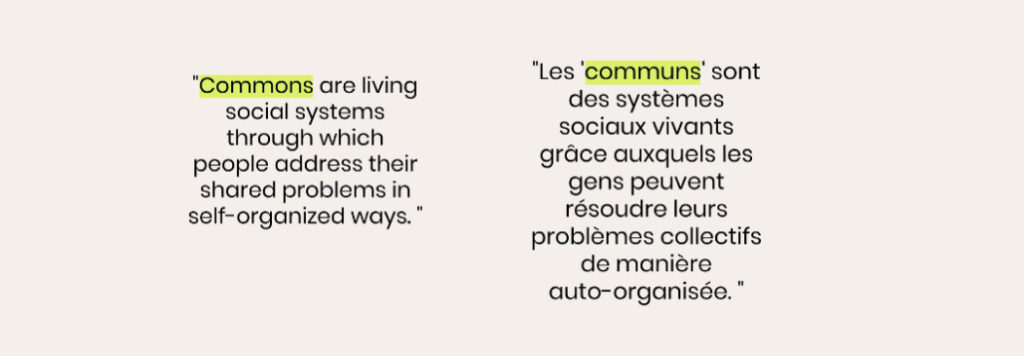“There is no Commons without commoning”. The Commons are a set of ongoing practices, not an inert physical resource.

Commons are in fact social systems. They come to life when self-organized communities dedicate themselves to sharing and managing wealth in fair ways – with minimal intervention by the state or the market. When we speak of wealth here we do not imply wealth in a monetary sense.

Rather we refer to what Silke Helfrich & David Bollier describe as “care-wealth” in their book Free, fair, and alive. Care-wealth emerges when people take care of forests, water, data, or urban spaces, and adopt these resources into their shared memory, culture, social lives, and identities. The aim of a Commons is to protect resources which underpin our shared wealth from becoming commodities to be used, extracted, and turned into elements of economic calculation. Commons can also be gifts of nature, public infrastructure, cultural heritage, traditions, and knowledge that all of us have received for free. The practice of commoning cultivates a responsibility in us to protect the wealth that we inherit or create together, so that we can pass it on, sometimes even improving it, to future generations.
Commons can take countless forms: from community parks and open source software networks to groups of people who share open seeds instead of buying patented ones. Wikipedia, cooperatives, and artist collectives.
If you wish to deepen your understanding of the Commons, we invite you to read our article “The Commons in a nutshell”, our introductory article on the Commons, as well as watch these short and helpful videos :
Heinrich-Böll-Stiftung : What are Commons? – An explanation of the idea (EN & TUN)
Silke Helfrich – The Basics of Commons – Leuphana Digital School
Silke Helfrich – The Basics of Commons – Leuphana Digital School
Urbánika and the solarpunk awakening : David Bollier – What are the Commons? / ¿Qué es el ProComún? (EN / SP)
Remix the Commons – Qu’est-ce que les Communs ? (FR)
Utrecht University – What are Commons? (EN)
If you are interested in deepening your knowledge about the Commons, we recommend you to start by reading the following books:
David Bollier, The Commoner’s Catalog for Changemaking
In 25 thematic sections, The Commoner’s Catalog for Changemaking explores commoning practices through profiles of groundbreaking commons projects, books, websites, organizations, and activist innovations.
David Bollier, Think Like a Commoner
A Short Introduction to the Life of the Commons (New Society Publishers)
David Bollier & Silke Helfrich, The wealth of the Commons
A collection of 73 essays about contemporary commons by an international roster of activists, academics, and project leaders.
David Bollier & Silke Helfrich, Patterns of Commoning (Off the Common Books, 2015)



